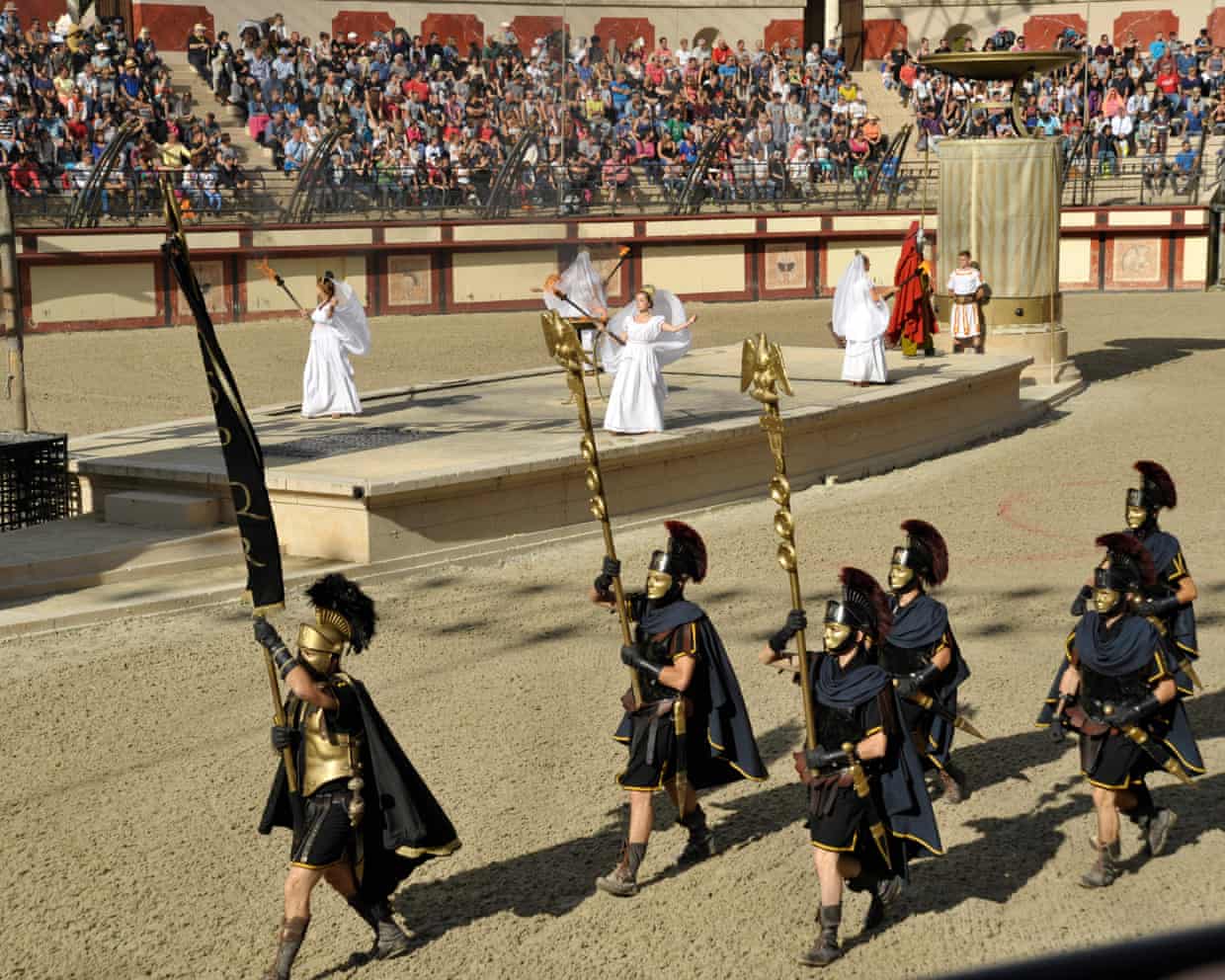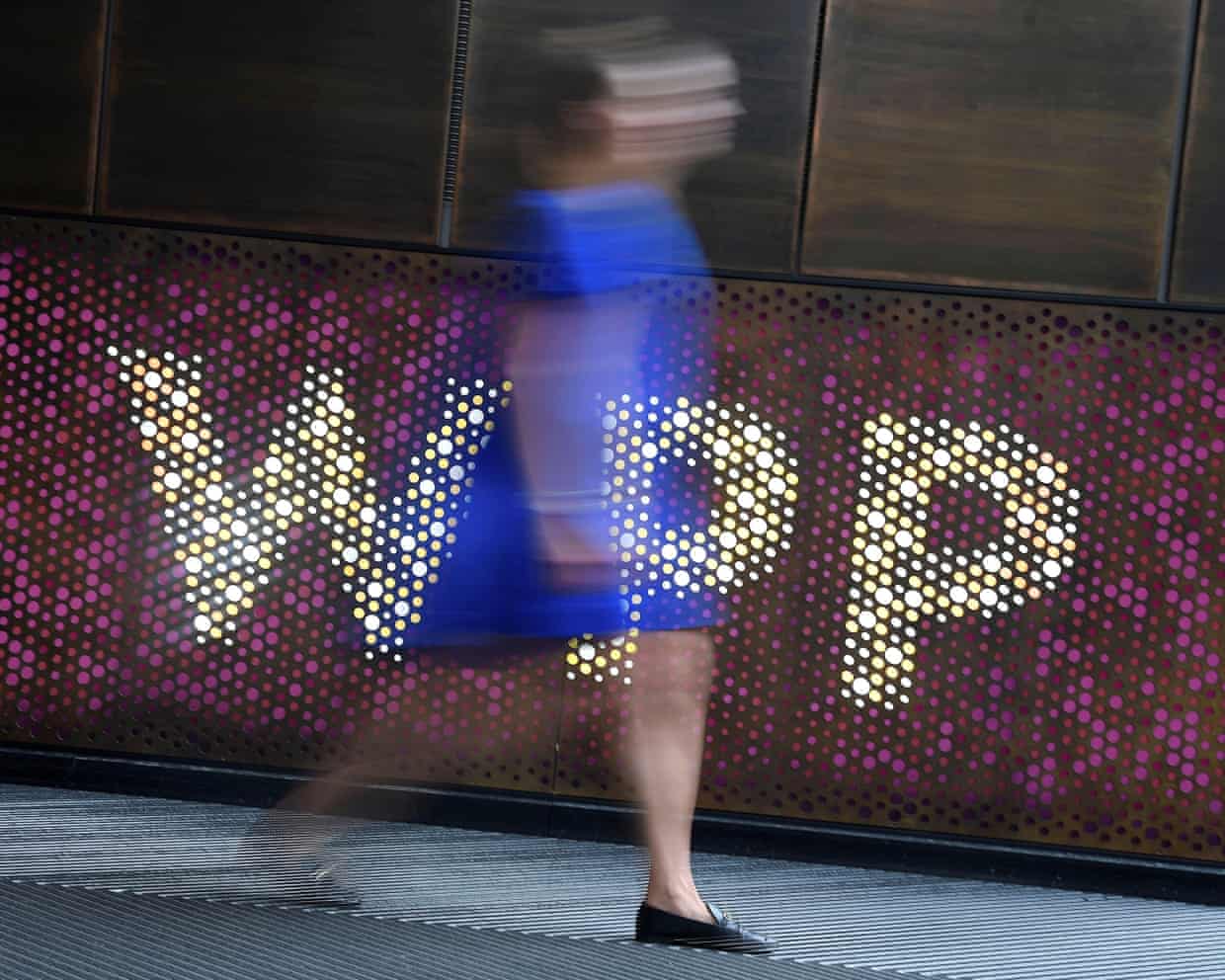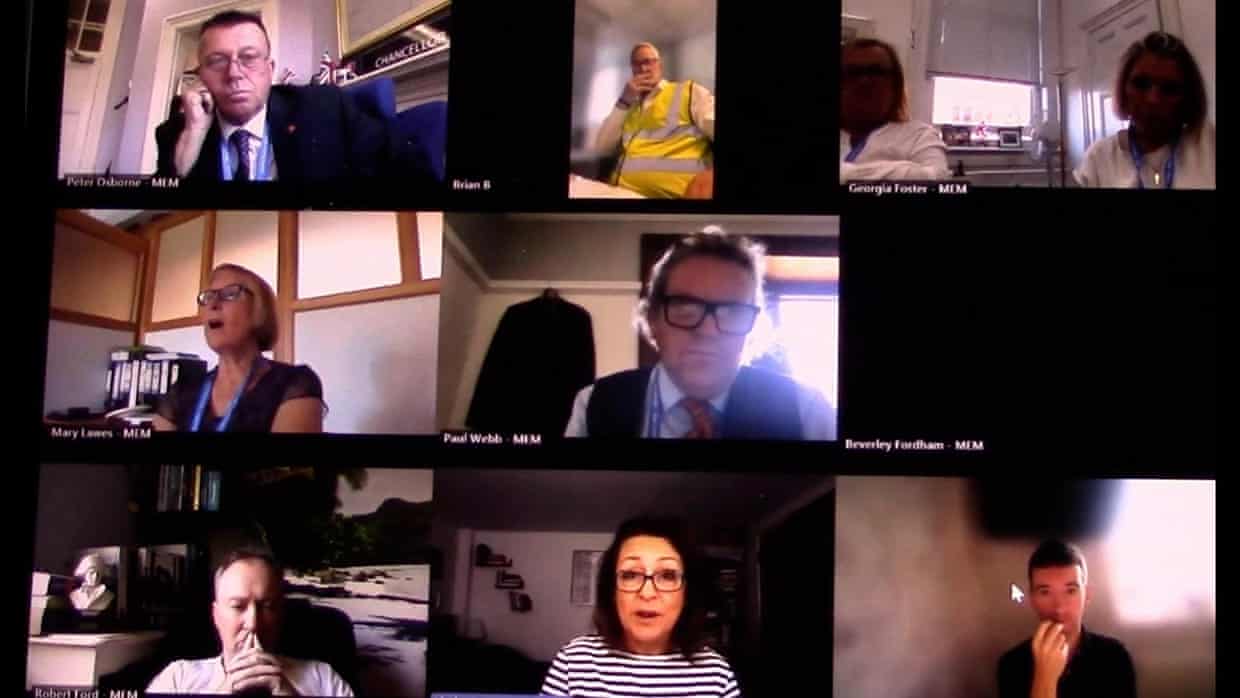French theme park firm won UK government support despite far-right ties

A French business that is planning to build a vast £600m historical theme park in rural Oxfordshire won help for its plans from the previous government despite its founding family’s ties to the far right and past praise of Vladimir Putin.Correspondence obtained under freedom of information (FoI) laws showed the Conservative peer Dominic Johnson, a business and trade minister in Rishi Sunak’s government, promised to “assist” Puy du Fou – one of France’s most popular theme parks – in finding a UK site.An unnamed UK official later said departmental staff based in France would be available to provide more help, while the company later described the government as having been “very supportive” of its plans.The company subsequently unveiled proposals to build mock medieval castles, hotels and restaurants on farmland near the M40 in Oxfordshire.The project has proved controversial, partly owing to objections from local people based on concerns about traffic, the demand on local water supplies and the potential environmental impact.
In February, the Guardian revealed that some living in the area also had misgivings about the De Villiers family behind the business.Puy du Fou’s founder, Philippe de Villiers, has been criticised for expressing far-right views, while his son Nicolas, who runs the business, appeared to praise Putin after the invasion of Crimea in 2014.The company said many of the objections to its park were based on “conspiracy theory mischief making” by local opponents of the plan and that it had passed a government due diligence process “with ease”.A heavily redacted cache of emails obtained under FoI law show that in December 2022, Lord Johnson of Lainston – then a minister at the Department for Business and Trade (DBT) – met representatives of Puy du Fou.He told them he had asked the Office for Investment to contact the company to discuss “how we may assist you in site selection”.
The peer also asked to be kept informed of “the outcomes we deliver”,In a subsequent letter, in June last year, an unnamed government official told Puy du Fou: “My DBT colleagues in France are on hand to support you with your UK project,” but added that Johnson could no longer discuss policy because a general election had been called,This year, after the Guardian published details of the De Villiers family’s links to the far right and apparent praise of Putin, Puy du Fou met Labour MP Chris Bryant, who was then a minister at the Department for Culture, Media and Sport,Bryant raised concerns about the issues mentioned in the Guardian’s reporting, the emails showed,A readout of the meeting showed that Puy du Fou considered the government had been “very supportive” and asked for this support to be relayed to the local authorities – Cherwell district and Oxfordshire county council.
A DBT spokesperson declined to comment on whether ministers had spoken to the two councils, but said officials were “reassured” that Puy du Fou no longer had ties to Russia and signalled continued support for the park, saying it represented “a substantial investment in our visitor economy” that would create jobs and drive growth,Philippe de Villiers, a scion of an aristocratic family, conceived Puy du Fou in the 1970s after discovering a ruined Renaissance castle in western France,It has since grown into one of the country’s most popular tourist attractions and the company also has a park in Toledo, Spain,The company formally submitted a planning application for the Oxfordshire site in August,It has won support from fans in Britain, some of whom have set up a group called We Want Puy du Fou UK.
But some local people have raised concerns about the project’s impact on the area, as well as the family behind it.De Villiers, a well-known rightwing politician, founded a party whose manifesto included a ban on the construction of new mosques and a prohibition on gay marriage and same-sex adoption.He still has a weekly political television show in France on which he regularly rails against immigration and Islam.In January, he attended the funeral of Jean-Marie Le Pen, the founder of the far-right party now known as National Rally.Guests included De Villiers’ longtime associate, the far-right presidential candidate Éric Zemmour, who was found guilty of hate speech in 2022 after a tirade against unaccompanied immigrant children, whom he described as thieves, rapists and murderers.
“What he defends is what I live for,” De Villiers said shortly after Zemmour made the remarks,De Villiers is no longer involved in management of the Puy du Fou company,In 2014, his son Nicolas de Villiers, who now runs the business, appeared to defend Putin over Russia’s invasion of Crimea after visiting Moscow to discuss plans for two theme parks under the brand Tsargrad, including one planned for the peninsula,Puy du Fou’s local investment partner would have been Konstantin Malofeyev, a billionaire oligarch who was already under US, UK and EU sanctions because of his financing of Russia-friendly separatists in Ukraine,In an interview in the trade publication Attractions Management in 2015, Nicolas de Villiers described Putin as having “sweet eyes and sweet words” and claimed the international community had misunderstood the Russian president.
De Villiers said sanctions would not affect plans to build a Crimean park, and Malofeyev was a man of “great moral power”.Puy du Fou said: “There simply is no issue here, as much as the local objectors would like to create one … Puy du Fou ceased all contact with Russian authorities and their representatives in 2014.”It said local opponents of the plans for a park in Oxfordshire had been spreading “conspiracy theories”, adding that it was right that the UK government was trying to “help foreign investors invest in the UK, delivering much needed growth and new employment”.The company said it had not provided support to We Want Puy du Fou UK but had met some of its members and hosted them at its French park.It said opponents of the park had declined the same invitation.
The best public interest journalism relies on first-hand accounts from people in the know.If you have something to share on this subject you can contact the Business team confidentially using the following methods.Secure Messaging in the Guardian appThe Guardian app has a tool to send tips about stories.Messages are end to end encrypted and concealed within the routine activity that every Guardian mobile app performs.This prevents an observer from knowing that you are communicating with us at all, let alone what is being said.
If you don't already have the Guardian app, download it (iOS/Android) and go to the menu.Scroll down and click on Secure Messaging.When asked who you wish to contact please select the Guardian Business team.SecureDrop, instant messengers, email, telephone and postIf you can safely use the tor network without being observed or monitored you can send messages and documents to the Guardian via our SecureDrop platform.Finally, our guide at theguardian.
com/tips lists several ways to contact us securely, and discusses the pros and cons of each,

What’s gone wrong at WPP? The crown slips at the world’s biggest advertising group
A dark joke is doing the rounds in adland that Wire and Plastic Products, the Kent-based basketmaker that Martin Sorrell bought 40 years ago as a vehicle to build a global advertising giant, might outlast WPP.For decades the financial success and dominance of WPP – its 100,000 employees service global clients from Ford to Coca-Cola – has been the corporate manifestation of Britain’s shining reputation for creative advertising.WPP has housed some of the most prestigious agency networks – from J Walter Thompson to Young & Rubicam – producing globally resonant campaigns such as Dove’s Real Beauty, which challenged stereotypical portrayals of women.Among WPP’s greatest hits are the unlikely pairing of the Sex Pistol John Lydon with Country Life butter, and decades of work for Coca-Cola, including Ogilvy convincing the company to replace its logo on bottles with personal names – a global phenomenon still on shelves 12 years later.But now, as WPP struggles to stem a growing exodus of clients worth billions of pounds and deal with an existential race to match the AI and data capabilities of rivals, there is hitherto unthinkable talk of a breakup

Experiential entertainment is having a gold rush but commercial success is far from certain
When the first ever stage adaptation of the global book and film franchise The Hunger Games opens its doors in London next week, fans paying up to £200 have been promised an “electrifying” and “immersive” experience.The show at the purpose-built 1,200 seat Troubadour in Canary Wharf, which features Hollywood A-lister John Malkovich appearing via screen as the evil President Snow who oversees the televised spectacle of teenagers fighting to the death, is the latest in an explosion of launches looking to cash in on a boom in consumer demand for experiential entertainment, often linked to bankable franchises.The boom in the market for experimental, unusual nights out and shows is well established, from escape rooms, axe throwing and slumber parties to Secret Cinema’s Olympic Park takeover to recreate the setting for Back to the Future and the hugely successful Abba Voyage. Recent pop-ups include experiences linked to Minecraft, Jurassic World and Squid Game.As big money has rolled into the sector, so too has a desire from companies to rely on solid gold intellectual property to bring in the crowds – with mixed results

French theme park firm won UK government support despite far-right ties
A French business that is planning to build a vast £600m historical theme park in rural Oxfordshire won help for its plans from the previous government despite its founding family’s ties to the far right and past praise of Vladimir Putin.Correspondence obtained under freedom of information (FoI) laws showed the Conservative peer Dominic Johnson, a business and trade minister in Rishi Sunak’s government, promised to “assist” Puy du Fou – one of France’s most popular theme parks – in finding a UK site.An unnamed UK official later said departmental staff based in France would be available to provide more help, while the company later described the government as having been “very supportive” of its plans.The company subsequently unveiled proposals to build mock medieval castles, hotels and restaurants on farmland near the M40 in Oxfordshire.The project has proved controversial, partly owing to objections from local people based on concerns about traffic, the demand on local water supplies and the potential environmental impact

The return of ‘Tescopoly’? How Britain’s biggest retailer dominates everyday life
Supermarket chain has quietly got its groove back to grab even more of shoppers’ spending this yearReach into your pocket and you will probably find evidence of Tesco. Whether it is a Clubcard, mobile phone or just a receipt from one of its 3,000 stores, the UK’s biggest retailer is engrained in everyday British life.As its chief executive, Ken Murphy, proudly proclaimed this month, the supermarket chain has grabbed even more of our spending this year, landing almost a third of all grocery sales and receiving more than £1 in every £10 spent in UK retail. Data released this week showed Tesco’s sales growth outgunning its traditional rivals.The retailer’s resurgence represents a remarkable turnaround for a business whose relentless growth across Britain through the 1990s and early 2000s was abruptly curtailed as management became too focused on overseas expansion and profits over service

Ed Miliband needs a plan now to help industry weather UK transition to net zero | Phillip Inman
Ed Miliband may want his political legacy to be a transition to net zero, but he could find his eventual political epitaph includes words on how he helped bury UK industry under the weight of high electricity charges.Industrial ovens are being switched off and turbines spun for the last time as businesses add up the cost of powering their factories and decide it’s not worth the time and trouble.It would be harsh to blame the energy secretary for a crisis he inherited and a decline in manufacturing that has been going on for four decades. But the way the transition to renewables was managed under the Tories, and now under Miliband can only be described as a disaster that will see much of UK industry depart for an easier life elsewhere.The decline is not new

What is private credit, and should we be worried by the collapse of US firms?
The collapse of two US firms, First Brands and Tricolor, has shone a light on private credit and its growing influence in the global economy.The failures have led to ballooning losses at traditional banks, and, coupled with worries about the health of US regional banks, have raised concerns about weak lending standards and potential threats from an opaque corner of the so-called shadow banking sector.But what is private credit and should we be worried?Private credit emerged in the 1980s as a relatively niche industry offering private loans to businesses.Unlike banks, where loans are backed by customer deposits, private credit firms’ loans are backed by money raised from private investors, including pension funds, insurers and high net worth individuals. But they have become increasingly intertwined with the traditional banking industry, with lenders in Europe and the EU significantly exposed to private credit firms

Reform council leader says she has launched hunt for ‘cowards’ behind leaked video

Environment groups are anything but ‘mute’ on the planning bill | Letters

Support for Reform UK increasing among British Indians, poll shows

Tory MP reports ‘AI-generated deepfake’ video announcing his defection to Reform UK

‘Suck it up’: leaked video exposes bitter infighting at Reform UK’s flagship Kent council

‘Super Dom’ Cummings cunningly waits five years to reveal national security lapses | John Crace